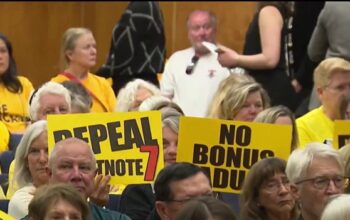Los Angeles is a worldwide tourist attraction. Now hotels that rent to tourists have been told they can no longer do that. Instead they have to rent to the city, so the city can give the rooms to the homeless. In other words, the city has taken over these hotels. That is called communism.
“In total, 21 residential hotels, which are single rooms and used as a means of affordable housing, were cited as breaking the law. According to the city, the owners are specifically breaking the 2008 Residential Hotel ordinance, which specifically established a moratorium on the demolition or conversion of residential hotel units to any other use, including hotels. Its ultimate aim was to keep in place as many low-cost rentals as possible to keep housing available for lower-income, elderly, and disabled citizens in LA.
However, hotel owners, between the ordinance, Project Roomkey, and more recent initiatives by Mayor Karen Bass to increase motel and hotel housing for the homeless, have felt squeezed in choosing what to do with their own property. Many renters are behind on payments, with owners finding it hard to collect payment or evict residents due to several state and city laws. Some have found loopholes over renter violations and safety concerns, while others have simply let out rooms to tourists or set up Airbnbs to help bridge the gaps in payments and between renters.”
These hotels are private property—as long as the owners are not using the facilities for illegal activities and are within the law, the city is stealing the property. More proof that government is theft.
LA Hotel Owners Forced to Rent to Homeless Instead of Tourists

Officials say that hotel owners are breaking city law
By Evan Symon, California Globe, 8/12/23 https://californiaglobe.com/articles/la-hotel-owners-forced-to-rent-to-homeless-instead-of-tourists/
The Los Angeles Housing Department announced this week that 17 owners of residential hotels in the city have received warnings over letting out rooms to tourists, highlighting that they are breaking city law if the rooms aren’t being rented out to city residents instead.
In total, 21 residential hotels, which are single rooms and used as a means of affordable housing, were cited as breaking the law. According to the city, the owners are specifically breaking the 2008 Residential Hotel ordinance, which specifically established a moratorium on the demolition or conversion of residential hotel units to any other use, including hotels. Its ultimate aim was to keep in place as many low-cost rentals as possible to keep housing available for lower-income, elderly, and disabled citizens in LA.
However, hotel owners, between the ordinance, Project Roomkey, and more recent initiatives by Mayor Karen Bass to increase motel and hotel housing for the homeless, have felt squeezed in choosing what to do with their own property. Many renters are behind on payments, with owners finding it hard to collect payment or evict residents due to several state and city laws. Some have found loopholes over renter violations and safety concerns, while others have simply let out rooms to tourists or set up Airbnbs to help bridge the gaps in payments and between renters. Still others have simply sold their property, putting all renters residing there into jeopardy as a result.
A crackdown this month, initially asked by Mayor Bass, on the hotel owners led to warnings being issued over tourists getting rooms over long-term low-income renters.
“So many are behind on rent,” said Anjali Singth, a motel co-owner in Los Angeles, to the Globe on Friday. “The COVID laws delayed payments for years. What can we do? Renting rooms against the ordinance is a way to stay in business, but now the city is denying us that.”
The Los Angeles City Council is also due to take action, with a motion to be considered soon that will have the Housing Department report on their enforcement of the residential hotel law. The Department will also soon say how enforcement methods of the ordinance can be improved.
The LA residential hotel ordinance
“I know very dramatically the impact of not having that enforced because that means more houses, more low-income units, that we as a city have to figure out how to build,” explained motion author and City Councilmember Bob Blumenfield. “It means more people on the street and more services and more costs and more human suffering. The loss of residential hotel rooms to tourist units may be exacerbating our homelessness crisis.”
“Nobody’s ever come to me and said, ‘We don’t have the money to enforce our residential hotel conversion law’. Now that I’m aware of it, I’m going to do what I can to make sure that it does get enforced.”
However, hotel owners are fighting back against the ordinance. Many are saying that they are a ‘hotel first’ and have hired lawyers to challenge the city ordinance. Others that were given warnings conversely sent in proof that they haven’t had hotel guests for years, only residents.
“The city is increasingly making hotel owners, especially owners of residential hotels, angry,” added Singth. “A few years ago we weren’t even talking about lawyers and taking the ordinance to court. Now we are. The city decided that, out of everyone in the city, we are the ones who have to help solve the housing and homeless [crises]. They’re approving so many luxury condos and expensive apartment complexes, but nothing low-income. It just falls to us. And more and more of us have had it. This is heading to a court battle probably if they don’t cut us some slack. These warnings are not the way to do it.
The LA City Council will consider the motion over residential hotels soon.



